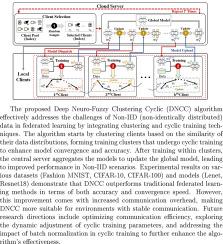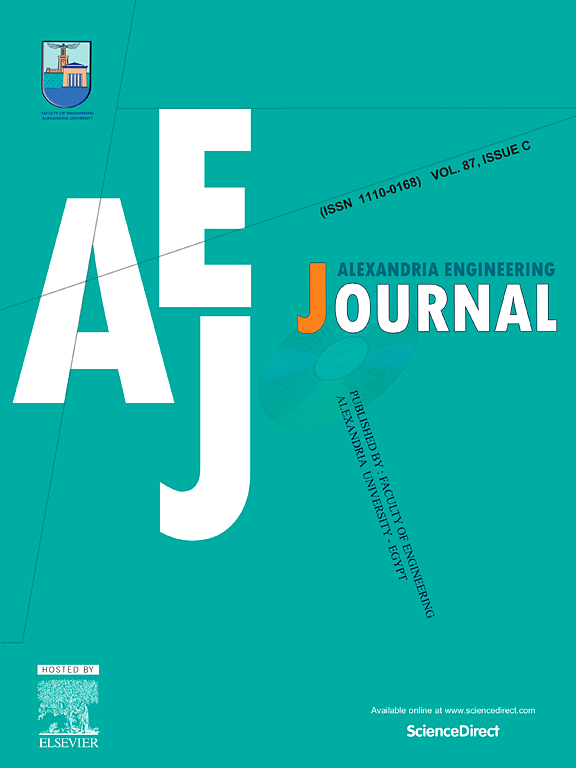利用深度神经模糊聚类循环算法提高联合学习中全局模型的准确性
IF 6.2
2区 工程技术
Q1 ENGINEERING, MULTIDISCIPLINARY
引用次数: 0
摘要
近年来,随着隐私保护日益受到重视,许多法律法规都对数据使用进行了规范,要求公司在获取个人数据时必须征得用户同意。这对于需要大量数据进行训练的模型来说,变得更具挑战性。因此,2016 年有人提出了联合学习的概念,目的是在不共享数据的情况下用不同的客户端训练模型,以确保数据隐私。然而,联合学习面临着一些挑战,包括异构设备、数据安全、数据异构性、通信成本和训练时间成本。本研究的重点是解决数据异构问题,即参与学习的客户端之间的数据分布差异很大,导致训练后的聚合模型性能不佳。为解决这一问题,我们提出了一种联合聚类循环算法,即分两步对客户端进行聚类,使每个聚类方法的数据分布独立且同分布。我们还引入了深度神经模糊方法来处理模糊、不确定或不完整的数据。实验结果表明,在各种非 IID 数据集上,所提出的深度神经模糊聚类循环算法优于 FedAvg、FedProx 和 CyclicFL 等方法,在某些实验中,准确率接近集中学习的准确率。这表明,本研究提出的深度神经模糊方法和聚类循环算法 DNCC 可以提高全局模型的准确性,尤其是在越来越多的非 IID 场景中。此外,我们还将这种方法扩展到大数据处理中,以应对更复杂的数据环境。本文章由计算机程序翻译,如有差异,请以英文原文为准。

Enhancing global model accuracy in federated learning with deep neuro-fuzzy clustering cyclic algorithm
In recent years, with the increasing importance of privacy protection, many laws and regulations have standardized data usage, requiring companies to obtain user consent to access personal data. This has become more challenging for models that require large amounts of data for training. Therefore, the concept of federated learning was proposed in 2016, aiming to train models with different clients without sharing data to ensure data privacy. However, federated learning faces several challenges, including heterogeneous devices, data security, data heterogeneity, communication costs, and training time costs. This study focuses on addressing the issue of data heterogeneity, where the data distribution among participating clients differs significantly, leading to poor performance of the aggregated model after training. To tackle this problem, we propose a federated clustering cyclic algorithm, which involves two-step clustering of clients to make the data distribution of each cluster approach independent and identically distributed. We also introduce deep neural fuzzy methods to handle fuzzy, uncertain, or incomplete data. According to experimental results, the proposed deep neuro-fuzzy clustered cyclic algorithm outperforms methods such as FedAvg, FedProx, and CyclicFL on various non-IID datasets, with accuracy approaching that of centralized learning in certain experiments. This indicates that the deep neural fuzzy methods and clustering cyclic algorithm DNCC presented in this study can improve the accuracy of global models, especially in increasingly non-IID scenarios. Furthermore, we extend this method to big data processing to cope with more complex data environments.
求助全文
通过发布文献求助,成功后即可免费获取论文全文。
去求助
来源期刊

alexandria engineering journal
Engineering-General Engineering
CiteScore
11.20
自引率
4.40%
发文量
1015
审稿时长
43 days
期刊介绍:
Alexandria Engineering Journal is an international journal devoted to publishing high quality papers in the field of engineering and applied science. Alexandria Engineering Journal is cited in the Engineering Information Services (EIS) and the Chemical Abstracts (CA). The papers published in Alexandria Engineering Journal are grouped into five sections, according to the following classification:
• Mechanical, Production, Marine and Textile Engineering
• Electrical Engineering, Computer Science and Nuclear Engineering
• Civil and Architecture Engineering
• Chemical Engineering and Applied Sciences
• Environmental Engineering
 求助内容:
求助内容: 应助结果提醒方式:
应助结果提醒方式:


